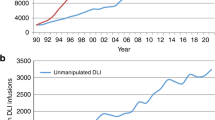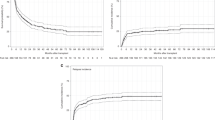Abstract
Clinical studies using genetic randomization cannot accurately answer whether adult patients with Philadelphia chromosome-negative acute lymphoblastic leukemia (ALL) who have a human leukocyte antigen (HLA)-matched sibling should undergo allogeneic hematopoietic stem cell transplantation (HSCT) or chemotherapy in first remission, as, in these studies, patients without a sibling donor undergo alternative donor transplantation or chemotherapy alone after a relapse. Therefore, we performed a decision analysis to identify the optimal strategy in this setting. Transition probabilities and utilities were estimated from prospective studies of the Japan Adult Leukemia Study Group, the database of the Japan Society for Hematopoietic Cell Transplantation and the literature. The primary outcome measure was the 10-year survival probability with or without quality of life (QOL) adjustments. Subgroup analyses were performed according to risk stratification on the basis of white blood cell count and cytogenetics, and according to age stratification. In analyses without QOL adjustments, allogeneic HSCT in first remission was superior in the whole population (48.3 vs 32.6%) and in all subgroups. With QOL adjustments, a similar tendency was conserved (44.9 vs 31.7% in the whole population). To improve the probability of long-term survival, allogeneic HSCT in first remission is recommended for patients who have an HLA-matched sibling.
This is a preview of subscription content, access via your institution
Access options
Subscribe to this journal
Receive 12 print issues and online access
$259.00 per year
only $21.58 per issue
Buy this article
- Purchase on Springer Link
- Instant access to full article PDF
Prices may be subject to local taxes which are calculated during checkout



Similar content being viewed by others
References
Gokbuget N, Hoelzer D . Treatment of adult acute lymphoblastic leukemia. Hematology Am Soc Hematol Educ Program 2006, 133–141.
Sebban C, Lepage E, Vernant JP, Gluckman E, Attal M, Reiffers J et al. Allogeneic bone marrow transplantation in adult acute lymphoblastic leukemia in first complete remission: a comparative study. French Group of Therapy of Adult Acute Lymphoblastic Leukemia. J Clin Oncol 1994; 12: 2580–2587.
Yanada M, Matsuo K, Suzuki T, Naoe T . Allogeneic hematopoietic stem cell transplantation as part of postremission therapy improves survival for adult patients with high-risk acute lymphoblastic leukemia: a metaanalysis. Cancer 2006; 106: 2657–2663.
Takeuchi J, Kyo T, Naito K, Sao H, Takahashi M, Miyawaki S et al. Induction therapy by frequent administration of doxorubicin with four other drugs, followed by intensive consolidation and maintenance therapy for adult acute lymphoblastic leukemia: the JALSG-ALL93 study. Leukemia 2002; 16: 1259–1266.
Takeshita A, Ohnishi K, Miyazaki Y, Jnnai I, Miyawaki S, Takahashi M et al. P-Glycoprotein is related to the achievement of complete remission but not to disease-free survival in adult acute lymphoblastic leukemia: A Prospective Analysis in the JALSG-ALL97 Study. Blood 2004; 104: (311A) (abstract 1095).
Atsuta Y, Suzuki R, Yoshimi A, Gondo H, Tanaka J, Hiraoka A et al. Unification of hematopoietic stem cell transplantation registries in Japan and establishment of the TRUMP System. Int J Hematol 2007; 86: 269–274.
Ottmann OG, Pfeifer H . Management of Philadelphia chromosome-positive acute lymphoblastic leukemia (Ph+ ALL). Hematology Am Soc Hematol Educ Program 2009, 371–381.
Goldstone AH, Richards SM, Lazarus HM, Tallman MS, Buck G, Fielding AK et al. In adults with standard-risk acute lymphoblastic leukemia, the greatest benefit is achieved from a matched sibling allogeneic transplantation in first complete remission, and an autologous transplantation is less effective than conventional consolidation/maintenance chemotherapy in all patients: final results of the International ALL Trial (MRC UKALL XII/ECOG E2993). Blood 2008; 111: 1827–1833.
Sung L, Buckstein R, Doyle JJ, Crump M, Detsky AS . Treatment options for patients with acute myeloid leukemia with a matched sibling donor: a decision analysis. Cancer 2003; 97: 592–600.
Pidala J, Anasetti C, Kharfan-Dabaja MA, Cutler C, Sheldon A, Djulbegovic B . Decision analysis of peripheral blood versus bone marrow hematopoietic stem cells for allogeneic hematopoietic cell transplantation. Biol Blood Marrow Transplant 2009; 15: 1415–1421.
Gooley TA, Leisenring W, Crowley J, Storer BE . Estimation of failure probabilities in the presence of competing risks: new representations of old estimators. Stat Med 1999; 18: 695–706.
Tavernier E, Boiron JM, Huguet F, Bradstock K, Vey N, Kovacsovics T et al. Outcome of treatment after first relapse in adults with acute lymphoblastic leukemia initially treated by the LALA-94 trial. Leukemia 2007; 21: 1907–1914.
Thomas DA, Kantarjian H, Smith TL, Koller C, Cortes J, O'Brien S et al. Primary refractory and relapsed adult acute lymphoblastic leukemia: characteristics, treatment results, and prognosis with salvage therapy. Cancer 1999; 86: 1216–1230.
Cornelissen JJ, van der Holt B, Verhoef GE, van't Veer MB, van Oers MH, Schouten HC et al. Myeloablative allogeneic versus autologous stem cell transplantation in adult patients with acute lymphoblastic leukemia in first remission: a prospective sibling donor versus no-donor comparison. Blood 2009; 113: 1375–1382.
Kiss TL, Abdolell M, Jamal N, Minden MD, Lipton JH, Messner HA . Long-term medical outcomes and quality-of-life assessment of patients with chronic myeloid leukemia followed at least 10 years after allogeneic bone marrow transplantation. J Clin Oncol 2002; 20: 2334–2343.
Syrjala KL, Langer SL, Abrams JR, Storer BE, Martin PJ . Late effects of hematopoietic cell transplantation among 10-year adult survivors compared with case-matched controls. J Clin Oncol 2005; 23: 6596–6606.
Fraser CJ, Bhatia S, Ness K, Carter A, Francisco L, Arora M et al. Impact of chronic graft-versus-host disease on the health status of hematopoietic cell transplantation survivors: a report from the Bone Marrow Transplant Survivor Study. Blood 2006; 108: 2867–2873.
Lee SJ, Kuntz KM, Horowitz MM, McGlave PB, Goldman JM, Sobocinski KA et al. Unrelated donor bone marrow transplantation for chronic myelogenous leukemia: a decision analysis. Ann Intern Med 1997; 127: 1080–1088.
Doubilet P, Begg CB, Weinstein MC, Braun P, McNeil BJ . Probabilistic sensitivity analysis using Monte Carlo simulation. A practical approach. Med Decis Making 1985; 5: 157–177.
Litzow MR . Evolving paradigms in the therapy of Philadelphia chromosome-negative acute lymphoblastic leukemia in adults. Hematology Am Soc Hematol Educ Program 2009, 362–370.
Huguet F, Leguay T, Raffoux E, Thomas X, Beldjord K, Delabesse E et al. Pediatric-inspired therapy in adults with Philadelphia chromosome-negative acute lymphoblastic leukemia: the GRAALL-2003 study. J Clin Oncol 2009; 27: 911–918.
Morishima Y, Morishita Y, Tanimoto M, Ohno R, Saito H, Horibe K et al. Low incidence of acute graft-versus-host disease by the administration of methotrexate and cyclosporine in Japanese leukemia patients after bone marrow transplantation from human leukocyte antigen compatible siblings; possible role of genetic homogeneity. The Nagoya Bone Marrow Transplantation Group. Blood 1989; 74: 2252–2256.
Acknowledgements
We thank all staff of the JALSG centers and the JSHCT centers for providing excellent patient care and reporting clinical data.
Author information
Authors and Affiliations
Corresponding author
Ethics declarations
Competing interests
The authors declare no conflict of interest.
Rights and permissions
About this article
Cite this article
Kako, S., Morita, S., Sakamaki, H. et al. A decision analysis of allogeneic hematopoietic stem cell transplantation in adult patients with Philadelphia chromosome-negative acute lymphoblastic leukemia in first remission who have an HLA-matched sibling donor. Leukemia 25, 259–265 (2011). https://doi.org/10.1038/leu.2010.260
Received:
Revised:
Accepted:
Published:
Issue Date:
DOI: https://doi.org/10.1038/leu.2010.260



